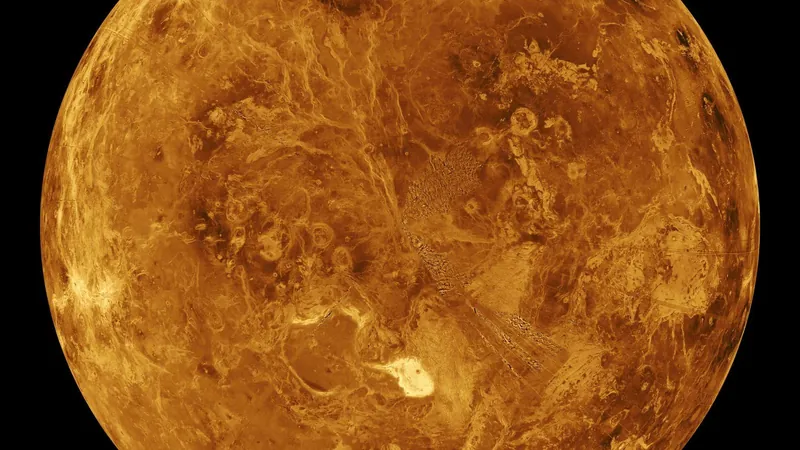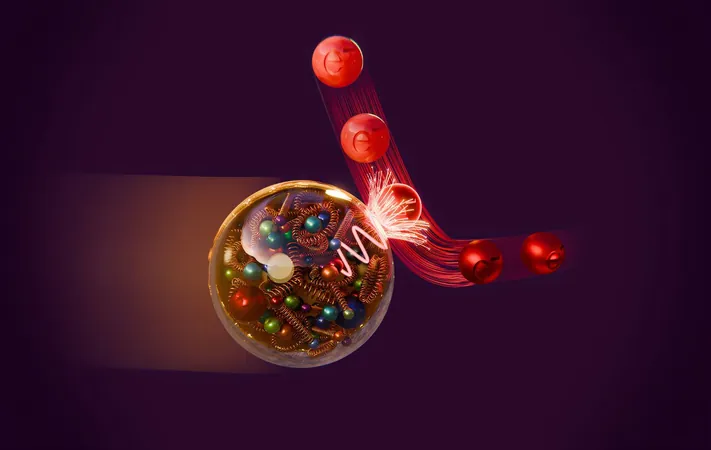
Shocking New Research Claims Venus May Have Never Had Oceans!
2024-12-02
Author: Jacques
In a groundbreaking revelation that challenges long-held beliefs, recent research from the University of Cambridge suggests that Venus, often referred to as Earth's twin, may never have hosted oceans on its surface at any point in its history. This finding is stirring up intense debates among scientists and could reshape our understanding of planetary development in our solar system.
For years, theories have revolved around two primary narratives concerning the history of water on Venus. One theory posited that Venus enjoyed a temperate climate for billions of years, fostering conditions suitable for liquid water. The rival theory maintained that a scorching early state of Venus never allowed for the formation of surface water. However, the latest study steered by astrochemists Tereza Constantinou, Oliver Shorttle, and Paul B. Rimmer presents compelling evidence that the planet has always been a dry wasteland.
Their modeling of Venus' current atmospheric composition led to the startling conclusion that “the planet has never been liquid-water habitable,” firmly placing Venus’ gloomy environment in stark contrast to Earth’s thriving blue oceans.
NASA has labeled Venus as a "hellish world" with an average surface temperature soaring around 465 degrees Celsius (869 degrees Fahrenheit) and a staggering atmospheric pressure 90 times that of Earth’s. Moreover, the planet is cloaked in thick, corrosive clouds of sulfuric acid—further solidifying its reputation as a desolate locale.
The researchers also highlight that the planet's interior appears to lack hydrogen, suggesting a bleak reality: Venus is significantly drier than our own planet's interior. Rather than condensing into liquid, any water vapor in Venus’ atmosphere likely existed as steam, escalating the harsh conditions we observe today.
This research stands in stark contrast to a 2016 study by a team at NASA’s Goddard Institute for Space Studies, which previously speculated that ancient Venus may have been a much more hospitable environment. Utilizing sophisticated computer models typically reserved for climate change forecasts on Earth, the earlier team suggested that Venus could have supported life in its distant past.
“In light of these findings, we may need to reevaluate the potential for life—past or present—on not just Venus, but also planets beyond our solar system. It opens the door to new insights into what makes a planet habitable,” noted Michael Way, who spearheaded the earlier study.
Adding to the ongoing discussion, a recent analysis from the University of Chicago claimed that Venus has been uninhabitable for an astounding 70% of its history—an astonishing figure that surpasses earlier estimates by four times.
As scientists delve deeper into the mysteries of our neighboring planet, it remains clear: understanding Venus could unlock vital clues about planetary formation, habitability, and even the future of life on Earth. What other secrets lie hidden within our solar system's enigmatic planets? Stay tuned for more revelations that could change everything we know about the cosmos!









 Brasil (PT)
Brasil (PT)
 Canada (EN)
Canada (EN)
 Chile (ES)
Chile (ES)
 España (ES)
España (ES)
 France (FR)
France (FR)
 Hong Kong (EN)
Hong Kong (EN)
 Italia (IT)
Italia (IT)
 日本 (JA)
日本 (JA)
 Magyarország (HU)
Magyarország (HU)
 Norge (NO)
Norge (NO)
 Polska (PL)
Polska (PL)
 Schweiz (DE)
Schweiz (DE)
 Singapore (EN)
Singapore (EN)
 Sverige (SV)
Sverige (SV)
 Suomi (FI)
Suomi (FI)
 Türkiye (TR)
Türkiye (TR)